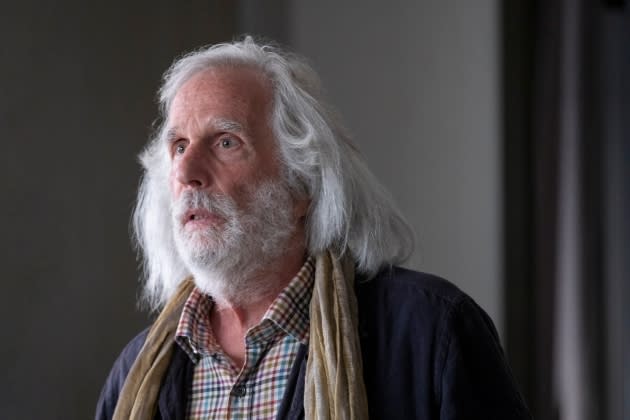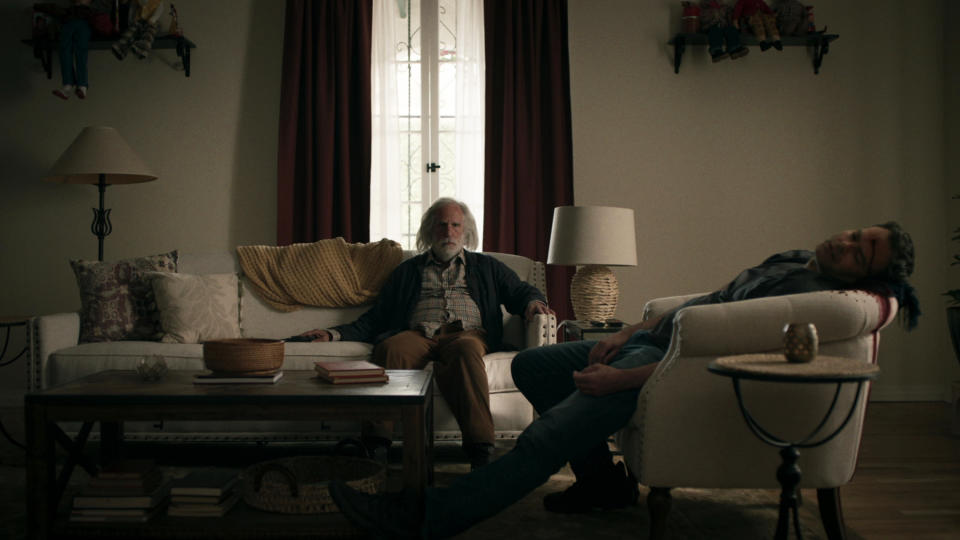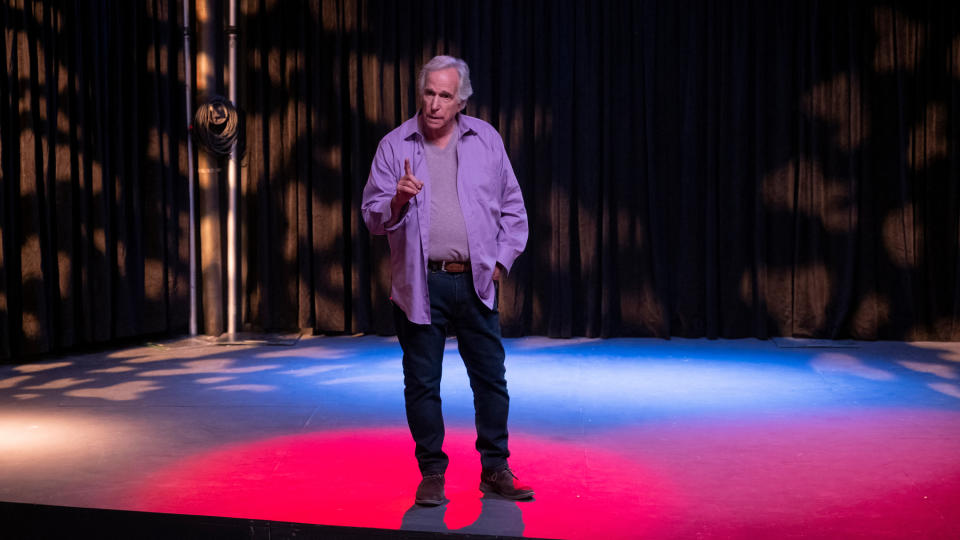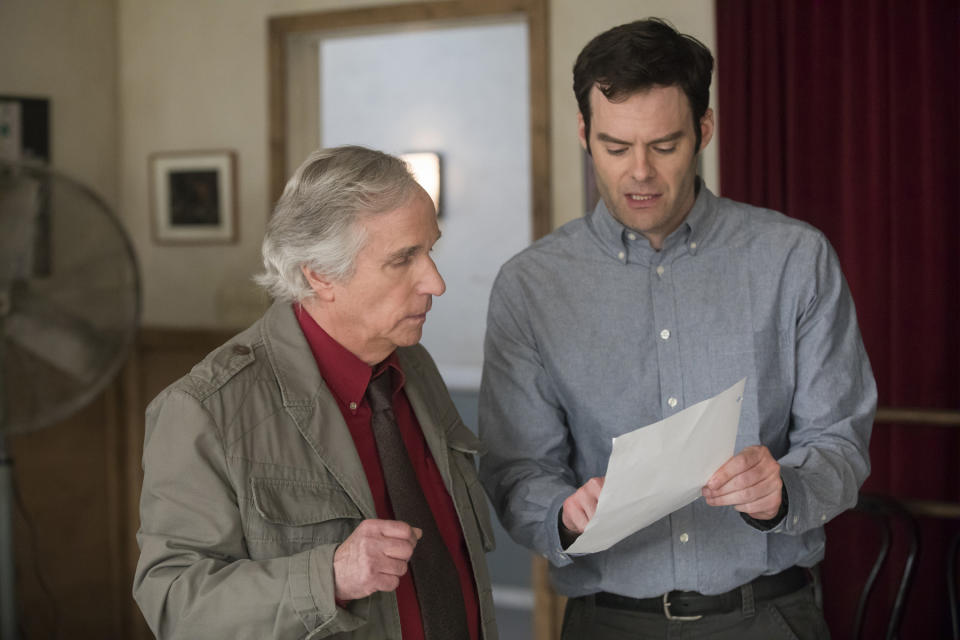‘Barry’ Finale: Henry Winkler on That Shocking Revenge Moment

This post contains spoilers for the series finale of Barry, which we recapped here.
Henry Winkler had already had the acting career of a lifetime decades before he got cast to play hacky, narcissistic acting teacher Gene Cousineau on HBO’s Barry. As Arthur “The Fonz” Fonzarelli on Seventies and Eighties sitcom smash Happy Days, he became one of the most famous men in the world, and to this day still gets smiles, hugs, and invitations to dinner pretty much everywhere he goes.
More from Rolling Stone
Sarah Goldberg's 'Barry' Exit Interview: Sally's Finale Secrets and More
'Barry' Plots Endgame With Most Action-Packed Episode of the Season
But as iconic as Fonzie was, Cousineau has been just as important to Winkler’s career — a chance after all this time, and all this celebrity, to show off the range and dramatic chops that had mostly lain dormant because of the long, long shadow the Fonz’s leather jacket cast over almost every job he took in between.
Cousineau isn’t in a lot of the series finale, but he commits the single most important act, murdering Barry (with the prop gun Rip Torn gave him once upon a time) as vengeance for the death of Gene’s girlfriend Janice Moss, and for Barry ruining the rest of Gene’s life.

Last week, Winkler spoke with Rolling Stone about why he thinks Gene pulled the trigger, why he treasures this role, watching Bill Hader evolve as a director, and more. (Oh, and there’s also a chance for this writer to get apologize to him him for a very old sin.)
How did you feel when you found out how Gene’s story was going to end?
I don’t even know how to describe it. Bill said to me, in the middle of the season, “Hey, want to know how it ends?” I went, “Sure.” He said, “You shoot me.” [Winkler pretends to stammer incredulously] Now, I’m not a speechless guy. I was speechless. I thought, Oh my god, I would never have seen that coming in a million years.
Why do you think Gene killed Barry?
The turning point, I think, was in Episode Seven, when I was duped into the hotel room, and there was no Mark Wahlberg, but there was the DA, and there was Jim Moss, and somehow, I got blamed for everything. And I think that I thought to myself, That’s just too far. You know, killing the woman that I love is one thing. Pinning it all on me is insane. And I went insane.
Right before Gene shoots Barry, we see his agent Tom on the verge of convincing Barry to turn himself in and exonerate Gene. Do you think Gene was thinking about the consequences of killing Barry?
It never entered my mind. I thought, If this is the ruse that they put me under, it must have been him. And there’s no more winning. This is the end of the game.

Gene spends a lot of the series bitter about the fame he feels he was deprived of earlier in his career. How do you think he would feel about this movie we see at the end of the finale, where a character based on him and named for him is the villain of an action movie?
I think that Gene, you watch him not helping himself, that he can’t help himself. I think that would not be the way that he would want fame to come to him. It was just, I cannot take this anymore.
You’ve had a long and incredible career. Where would you say Gene ranks among the most complicated roles you’ve had?
The. The most. I think that, again, I am overwhelmed that the wheel of fortune stopped on Gene. Not [fake game show host voice] “$25,000!” Not “You lose a turn!” It stopped on Gene. It’s a miracle in my life.
How has it been a miracle?
The writing. The group of human beings that I went to work with every day, on every side of the camera. In front, behind, the leadership. Our fairy godmother, Amy Gravitt at HBO, was so supportive of the entire in toto process. That crew took care of me within an inch of my life. At Gene’s moment in life, it’s not so easy when you’re on the floor, to stand up. That crew was there. They were a human crane.
You trained at Yale. You’ve had these great dramatic chops all this time. Then you became famous as the Fonz, who’s a great character but also someone who’s pretty straightforward and heroic and comedic. After that, did you ever think you’d get to play a character like this?
No. But I never get to think that I would play any of the characters that I play. It is a miracle. People say to me, “Wow, 50 years! What a career. It’s so full.” And I’m thinking, “I have no idea that it got to be this.” I went in on Arrested Development for two episodes. I stayed for five years. The Fonz introduced me to the world. 126 countries, no matter where I go, somebody invites me for dinner. In whatever language it is: “Bella bella! Oh, please, come! We’ll have dinner! My wife will cook!” What an indescribable journey. And I am grateful for every moment
When you moved out to Los Angeles to break into the business—
I had a thousand dollars from commercials. I thought that would take me through one month. And in two weeks, I auditioned for the Fonz at Paramount, and two weeks later they called me and asked me if I would like to do it.
That’s amazing. But before you got that audition, did you give much thought either to what your career could be like, or the kinds of parts you wanted to play?
No. Believe it or not, I was much more pragmatic than that. All I thought about was, “Am I going to work?” My agent at the time, Joan Scott, who took me on right out of graduate school, said to me, “You know, it’s going to be hard to sell you.” I thought, That is a 3,000 mile, $1000 mistake I’ve just made. And I was too anxious to go, “Ooohhh, I’ve got the confidence. Don’t worry about me!”
What’s it been like watching Bill grow and evolve as a director over these four seasons?
So I know for a fact that he came out here to be a director, and got sidetracked on Saturday Night Live. But he was an assistant editor for a friend of mine on a cooking show when he first started. You don’t question his vision. You know you’re in the hands of a wonderfulness. You have a question about your character and all that. But in the main context of the job, of the creation, Bill, and Alec [Berg] when he was here and directed, they were great. And Bill has met his destiny. He would shoot so economically, that sometimes we were out at 2 o’clock in the afternoon. That’s unheard of! Somehow he just shot only what he needed. I don’t know how to describe it. It’s just that this is where he belongs.

You have a reputation as the nicest man in show business. Never once have I ever heard anyone say anything bad about you, and people’s faces usually light up when your name is mentioned. Acting is acting, but what’s it been like to play a character in this business who has earned basically the opposite reputation?
There is a separation. I never think about that. I smoked, in the beginning of doing the Fonz, and people said to me, “You know, you’ve got a reputation. You’re this heroic character. Are you sure you want to be smoking?” And I thought to myself then, If I pervert myself in order to be something that I’m not interested in being, to preserve the character, the character will fail, the character will diminish, I will diminish. So I never put two and two together. [With Gene], this was my job, this was where he was going, this was who he is. And I brought Henry to him. In the middle of the first season, I think I turned to Alec and Bill and said, “Oh, he’s an asshole!” I first just thought he was a bad teacher, and they said, “Oh, we could write to that, too.”
You and Rip Torn were in a movie together, and you did an episode of The Larry Sanders Show. How well did you know him?
I didn’t know him well, but he was a character. Now there was very little separation between the guy and the screen. He said to me once [Rip Torn impression], “Wow, I’ll tell ya something! The CIA came after me and made me hold bowls of water out like this when they smacked me with two-by-fours!” I went, “Really? They did that to you?” He said, “Yeah, it was terrible, but I survived.” I’m not kidding. I’m serious.
Oh, I believe you. I’m just wondering how you think he would feel that he became something of a major plot point on this show, since Gene keeps shooting people with the gun Rip gave him?
Oh, I think he would think it was great. I think he would think it was funny. [Rip Torn impression again] “I knew he would put it good use! But he shot his son? That was stupid!”
Finally, I owe you an apology for something that happened 23 years ago.
Well, let’s see if I forgive you.
Back in 2000, you were nominated for comedy guest actor for an episode of a show called Battery Park.
Yes! Gary David Goldberg!
But I had seen all the episodes that aired before it was canceled, and I didn’t remember you being in any of them. I called someone at the Academy for clarification, and a few hours later they got back to me and said they’d found that the episode only aired on a Saturday afternoon on the West Coast, after golf, and after the eligibility window had closed. So they took your nomination away and gave it to William H. Macy. Which was not what I was trying to do! And I felt so much guilt for years until you finally won the Emmy for this. I’m sorry. I was not trying to be a narc. I swear.
No, because now it has become an amazing story. Who knows what would have happened in the first place? But I will say, how wonderful to know it was you.
[a long pause follows, and then the nicest man in show business’s demeanor turns menacing for just a moment, because he is a great actor]
Just put the phone down next time!
Best of Rolling Stone

 Yahoo Sports
Yahoo Sports 